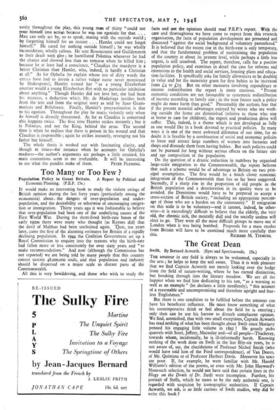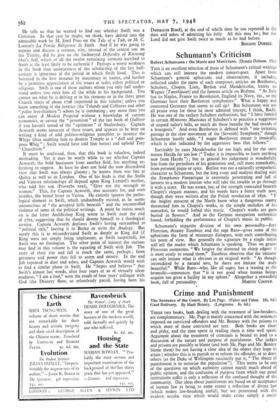The Great Dean
THE amateur in any field is always to be welcomed, especially in the arts ' - he helps to keep the soil sweet. Thus it is with pleasure that we find Captain Acworth not merely looking over the hedge from the field of nature-writing, where he has earned distinction, but breaking through into the literary meadow. We are all the happier when we find him dedicating to his son, " as a warning as well as an example " (he.declares a little needlessly), " this account of a reasonable and uncompromishig and therefore upright and fear- less Englishman."
But there is one condition to be fulfilled before the amateur can have his beneficent influence. He must know something of what his contemporaries think or feel about the field he is entering ; only then can he use his harrow to disturb complacent opinion. We find, astonished, that with two small exceptions, Captain Acworth has read nothing of what has been thought about Swift since Moriarty penned his engaging little volume in 1892 ! He greatly picks quarrels with Scott, Jeffrey, Macaulay and—of all people—Thackeray, towards whom, incidentally, he is ill-informedly harsh. Knowing nothing of the work done on Swift in the last fifty-six years, he is not aware of, say, the elucidations of Professor Nichol Smith (who would have told him of the Ford correspondence), of Van Doren, of Mr. Quintana or of Professor Herbert Davis. Moreover his texts are poor. If, for example, he were familiar with Mr. Harold Williams's edition of the poems, or even with Mr. John Hayward's Nonesuch selection, he would not have said that certain lines in the Elegy on the Death of- Dr. Swift were incomplete. Further, his portrait of Stella, which he states to be the only authentic one, is regarded with suspicion by iconographic authorities. If Captain Acworth, we ask, is so little curious of Swift studies, why did he write this book ? He tells us that he wanted to find out whether Swift was a Christian. In that case he might, we think, have delved into the admirable work by M. Emil Pons on the Tale of a Tub, or M. C. Looten's La Pens& Religieuse de Swift. And if he was going to reprint and discuss a sermon, why, instead of the central one on the Trinity, did he give us the hackneyed Difficulty of Knowing One's Self, which of all the twelve remaining sermons ascribed to Swift is the least likely to be authentic ? Perhaps a worse weakness in the book than unawareness of the scholarship of the last half- century is ignorance of the period in which Swift lived. This is betrayed in the first instance by inaccuracy in names, and further by a primitive appreciation of the issues at stake, either political or religious. Swift is one of those authors whom you only half under- stand unless you refer him all the while to his background. You cannot see what he is driving at in his sermons or in the three great Church tracts of about 1708 (reprinted in this volume) unless you know something of the heretics (the Tolands and Collinses and other " polite free-thinkers ") whom he is combating ; any more than you can enjoy A Modest Proposal without a knowledge of current economics, or savour the " pessimism " of the last book of Gulliver if you haven't tasted of the " optimism " of Shaftesbury. Captain Acworth seems innocent of these issues, and appears to be bent on writing a kind of -odd politico-religious pamphlet to trounce the Whigs (thus enabling him to dismiss Temple as a " dull and pom- pous Whig " ; Swift would hive told him better) and uphold Tory " Churchi sm."
It must be confessed, then, that this book is valueless, indeed misleading. Yet it may be worth while to see whether Captain Acworth, the bold buccaneer from another field, has anything re- freshing to suggest. At least he does not hold the now discredited view that Swift was always gloomy ; he knows there was fun at Quilca as well as in London. One of his finds is that the Stella and Vanessa relationships all depend upon King Lemuel's mother, who told her son (Proverbs xxxi), " Give not thy strength to women." This, for Captain Acworth, also accounts for, and even justifies, the brutal letter to. Varina. He entirely ignores the patho- logical element in Swift, which undoubtedly existed, as he seems unconscious of " the accepted hells beneath " and the uncontrolled violence of some of the political writings. A point he insists much on is the letter Archbishop King wrote to Swift near the end of 1711, suggesting that he should devote himself to a theological treatise. Captain Acworth deplores Swift's having succumbed to " political itch," leaving it to Butler to write the Analogy. But surely this is to misunderstand Swift as deeply as King did (if King were not simply being unpleasant, as Swift suspected), for Swift was no theologian. The other point of interest the curious may find in this volume is the equating of Swift with Job. The story of their rise and fall is much the same, perhaps ; from greatness and power they fell to scorn and misery. In the end Job repented in dust and ashes, and Captain Acworth would wish to find a similar phase in Swift. He "hopes and believes" that Swift's almost last words, after four years or so of virtually silent madness, " I am a fool," were the result of four years' colloquy with God (the Deanery floor, so relentlessly paced, having been his Damascus Road), at the end of which time he too repented in the dust and ashes of admitting his folly. All this may be ; but the Lord did not give Swift twice as much as he had before.
BONAMY DOBREE.



































 Previous page
Previous page